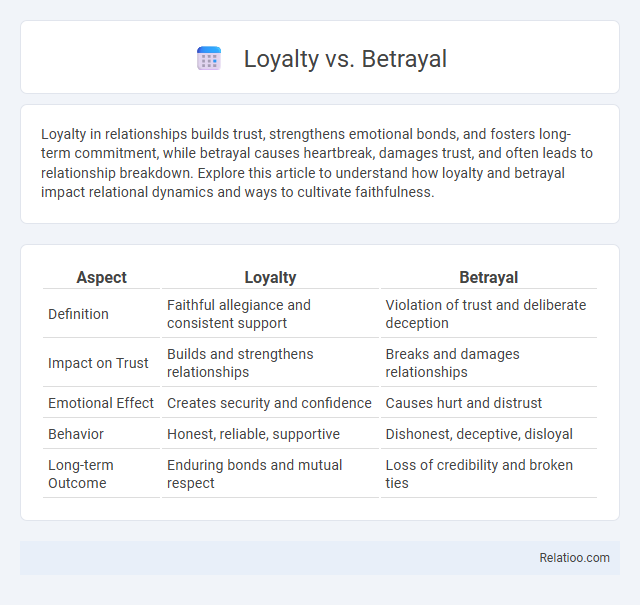Loyalty in relationships builds trust, strengthens emotional bonds, and fosters long-term commitment, while betrayal causes heartbreak, damages trust, and often leads to relationship breakdown. Explore this article to understand how loyalty and betrayal impact relational dynamics and ways to cultivate faithfulness.
Table of Comparison
| Aspect | Loyalty | Betrayal |
|---|---|---|
| Definition | Faithful allegiance and consistent support | Violation of trust and deliberate deception |
| Impact on Trust | Builds and strengthens relationships | Breaks and damages relationships |
| Emotional Effect | Creates security and confidence | Causes hurt and distrust |
| Behavior | Honest, reliable, supportive | Dishonest, deceptive, disloyal |
| Long-term Outcome | Enduring bonds and mutual respect | Loss of credibility and broken ties |
Understanding Loyalty: Definition and Importance
Loyalty is a deep commitment and unwavering support to a person, group, or cause, forming the foundation of trust and strong relationships. Understanding loyalty is essential for recognizing its role in fostering collaboration, resilience, and long-term success in personal and professional settings. Your ability to distinguish loyalty from betrayal can greatly influence decision-making and the strength of your connections.
The Many Faces of Betrayal
Betrayal manifests in various forms, ranging from subtle deceit to overt treachery, challenging trust and loyalty within relationships. Emotional betrayal often involves broken promises and hidden motives, while strategic betrayal can stem from power struggles or survival instincts. Understanding these diverse faces of betrayal is crucial to navigating complex interpersonal dynamics and rebuilding trust.
Psychological Roots of Loyalty
Loyalty stems from deep psychological roots such as attachment, trust, and the need for social belonging, which influence your emotional connections and decision-making. Betrayal shatters this foundation by breaking trust and causing emotional pain, leading to feelings of vulnerability and loss. Understanding these dynamics helps in recognizing how loyalty evolves and the impact betrayal has on relationships.
Why People Betray: Common Motivations
People betray due to a variety of motivations, including personal gain, fear, or perceived injustice. Loyalty is often challenged when individuals prioritize self-interest or experience emotional pain, leading to decisions that harm trust. Your understanding of these motivations can help in recognizing and addressing the root causes of betrayal in relationships.
Loyalty in Relationships: Friends, Family, and Partners
Loyalty forms the foundation of trust in relationships with friends, family, and partners, fostering deep emotional bonds and mutual support. It involves consistent reliability, honesty, and standing by others during challenges, which strengthens connection and resilience. Betrayal, by contrast, erodes this trust, causing emotional pain and fragmentation, highlighting the vital role loyalty plays in sustaining healthy, enduring relationships.
Betrayal’s Emotional and Social Consequences
Betrayal triggers intense emotional turmoil, including feelings of hurt, anger, and mistrust, which can severely damage an individual's psychological well-being. Socially, betrayal often leads to the breakdown of relationships, isolation, and strained community bonds due to diminished trust and increased suspicion. The long-term impact of betrayal includes difficulty in forming new attachments and persistent anxiety in personal and professional interactions.
The Thin Line: When Loyalty Turns Dangerous
Loyalty can strengthen relationships, but the thin line between loyalty and betrayal emerges when blind allegiance leads to harmful decisions or unethical behavior. Your unwavering commitment may unintentionally enable toxic patterns, making loyalty dangerous if it suppresses truth or justice. Recognizing when loyalty shifts into betrayal requires critical awareness of motives and consequences within personal and professional dynamics.
Rebuilding Trust After Betrayal
Rebuilding trust after betrayal requires consistent transparency, genuine accountability, and time to heal emotional wounds. Establishing open communication channels and setting clear boundaries helps restore a sense of security and reliability. Trust can gradually be restored when actions consistently align with promises, demonstrating commitment to loyalty and change.
Loyalty vs Blind Obedience: Knowing the Difference
Loyalty involves a conscious, ethical commitment to support a person or cause, while blind obedience is unquestioning compliance without critical thought. Understanding the difference helps prevent manipulation and ensures that allegiance aligns with personal values and moral judgment. True loyalty encourages trust and integrity, whereas blind obedience can lead to harmful consequences by suppressing individual autonomy.
Cultivating Healthy, Trustworthy Connections
Loyalty strengthens bonds by fostering trust, consistency, and mutual respect within relationships. Betrayal severely damages these connections, eroding trust and creating emotional distance that is challenging to repair. Cultivating healthy, trustworthy connections requires transparent communication, empathy, and a commitment to integrity to prevent betrayal and nurture lasting loyalty.

Infographic: Loyalty vs Betrayal
 relatioo.com
relatioo.com